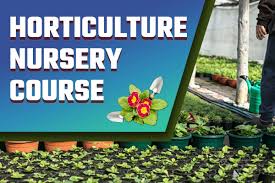
The Value of Learning Basic Horticulture
Are you looking to deepen your understanding of plants and gardening practices? Consider enrolling in a basic horticulture course. Whether you are a novice gardener or an experienced plant enthusiast, there are numerous benefits to gaining foundational knowledge in horticulture.
Understanding Plant Biology
A basic horticulture course will introduce you to the fundamentals of plant biology. You will learn about plant anatomy, physiology, and growth processes. Understanding how plants function at a cellular level can help you make informed decisions when caring for your garden or houseplants.
Practical Gardening Skills
Through hands-on activities and demonstrations, you will acquire practical gardening skills that can be applied in your own garden or indoor space. From soil preparation and propagation techniques to pest management and pruning methods, a basic horticulture course equips you with the tools needed to nurture healthy plants.
Environmental Awareness
Studying horticulture can deepen your appreciation for the natural world and increase your awareness of environmental issues. You will learn about sustainable gardening practices, conservation efforts, and the importance of biodiversity in maintaining healthy ecosystems.
Career Opportunities
If you are considering a career in horticulture or related fields, a basic horticulture course can serve as a stepping stone towards further education or employment opportunities. Many botanical gardens, nurseries, landscaping companies, and agricultural organizations value individuals with a solid foundation in horticultural principles.
Community Engagement
By participating in a basic horticulture course, you may also have the opportunity to connect with like-minded individuals who share your passion for plants and gardening. Building relationships within the horticultural community can lead to collaborations on projects, sharing of resources, and lifelong friendships.
Whether you aspire to become a master gardener or simply want to enhance your gardening skills for personal enjoyment, enrolling in a basic horticulture course is a rewarding investment in your knowledge and appreciation of the natural world.
5 Essential Tips for Excelling in a Basic Horticulture Course
- Choose a course that covers fundamental topics like plant biology, soil science, and pest management.
- Practice hands-on skills such as planting seeds, pruning plants, and identifying common plant diseases.
- Take notes during lectures and review them regularly to reinforce your understanding of horticultural concepts.
- Engage with your instructors and peers by asking questions and participating in discussions to deepen your knowledge.
- Explore internship or volunteer opportunities in horticulture to gain practical experience and network with professionals in the field.
Choose a course that covers fundamental topics like plant biology, soil science, and pest management.
When selecting a basic horticulture course, it is essential to choose one that covers fundamental topics such as plant biology, soil science, and pest management. Understanding plant biology will provide insights into the inner workings of plants, while knowledge of soil science is crucial for successful gardening practices. Learning about pest management techniques will equip you with the skills needed to identify and address common garden pests effectively. By focusing on these core subjects, you can build a strong foundation in horticulture that will benefit your gardening endeavors in the long run.
Practice hands-on skills such as planting seeds, pruning plants, and identifying common plant diseases.
In a basic horticulture course, students have the opportunity to practice essential hands-on skills that are fundamental to successful gardening. From planting seeds and nurturing seedlings to mastering the art of pruning plants for optimal growth, participants gain valuable experience in caring for a variety of plant species. Additionally, learning to identify common plant diseases equips individuals with the knowledge needed to detect and address issues early on, promoting plant health and vitality. By engaging in these practical activities, students not only enhance their gardening proficiency but also develop a deeper appreciation for the intricate world of plants.
Take notes during lectures and review them regularly to reinforce your understanding of horticultural concepts.
Taking notes during lectures in a basic horticulture course is a valuable practice that can significantly enhance your learning experience. By jotting down key points, important concepts, and practical tips, you create a personalized study resource that reinforces your understanding of horticultural principles. Regularly reviewing your notes not only helps solidify the information in your memory but also allows you to identify areas where you may need further clarification or practice. This active engagement with course material can deepen your knowledge and ultimately contribute to your success in applying horticultural concepts in real-world gardening scenarios.
Engage with your instructors and peers by asking questions and participating in discussions to deepen your knowledge.
Engaging with your instructors and peers by asking questions and actively participating in discussions during a basic horticulture course is a valuable strategy to deepen your knowledge and enhance your learning experience. By seeking clarification, sharing insights, and exchanging ideas with others in the class, you can gain a deeper understanding of horticultural concepts and practices. This interactive approach not only fosters a supportive learning environment but also allows you to benefit from the diverse perspectives and experiences of your instructors and fellow students. Embracing opportunities for dialogue and collaboration can enrich your learning journey and help you cultivate a deeper appreciation for the world of plants and gardening.
Explore internship or volunteer opportunities in horticulture to gain practical experience and network with professionals in the field.
Exploring internship or volunteer opportunities in horticulture is a valuable way to complement your basic horticulture course by gaining hands-on practical experience and networking with professionals in the field. By immersing yourself in real-world horticultural settings, you can apply the knowledge and skills learned in your course to actual projects, further enhancing your understanding of plant care and cultivation. Additionally, connecting with experienced professionals through internships or volunteer work allows you to build relationships, seek mentorship, and potentially open doors to future career opportunities in the diverse and rewarding field of horticulture.
